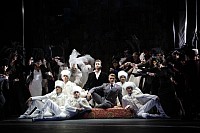 Hysteria is trumped by dark laughter – Die Schöne Helena/ Der Zarewitsch
Hysteria is trumped by dark laughter – Die Schöne Helena/ Der Zarewitsch
Komische Oper/ Staatsoperette Dresden – Financial Times
Two state capitals, two operetta premieres, two gay takes on dated subject matter, two very different outcomes. Is operetta the new camp? Is camp the new conservative?
In Berlin, Barry Kosky turns Offenbach´s 1868 La Belle Hélène into a squealing, sequinned party; in Dresden, Robert Lehmeier transmutes Lehár´s 1927 Zarewitsch to today´s homophobic, repressive Russia.
Kosky´s extroverted romps have hit a popular nerve in Berlin, where his contract as intendant has just been extended until 2022. HisDie Schöne Helena is loud, bright, and relentlessly high-octane.
Offenbach´s wit played between references to Greek myth and contemporary French politics – both tricky for today´s public. Kosky fills the gaps with a non-stop sprint of gags and pratfalls – fatman jokes, Wagner jokes, drag queen jokes, wheelchair jokes, bum jokes, and more. Soloists and chorus members are a constant blur of motion, squealing and hooting with glee, waving and kicking on every beat. They give it their all, burn plenty of calories, sing well, and give the appearance of having a fabulous time.
Being in the audience is a bit like being the only sober guest at a party that has gone out of control. At the second performance, audience laughter faltered as the evening wore on, and seats stayed empty after interval.
Lehár´s Zarewitsch prefers gymnastics to kissing, and tolerates no woman in his presence. He falls for Sonja only because she is disguised as a boy. But his father, the Tsar, is fading, and the state requires him to marry.
It is not much of a stretch to update the Russian head of state, and to take the prince´s preference for young men to its logical conclusion. For Dresden´s slick yet profound production, Lehmeier adds a larger-than-life Putin portrait and a silent lover to the constellation. Sonja remains a neglected ring-in, The Zarewitsch loves a handsome soldier, and they flee to Naples, where their ménage à trois is tolerated, but ultimately the demands of the state triumph.
There are plenty of laughs at the Dresden Staatsoperette, but beneath them is a core of real emotion, and a deep sense of melancholy. Richard Samek and Astrid Kessler give superb performances in the leading roles, Christopher Tölle´s choreography is a thing of beauty, and Andreas Schüller conducts with delicacy and joy.
In Berlin, Henrik Nánási whips up a storm in the orchestra pit. Tansel Akzeybek makes a winning Paris, and Nicole Chevalier is an entirely plausible Helena. But in their narcissistic world of hysteria, it is impossible to care how anybody feels. In Dresden, it is impossible not to care.
In Kosky´s defence, Lehár´s Zarewitsch is simply a better piece than Offenbach´s Hélène. But that is not really the point. Kosky sets out to entertain: no more, no less. Lehmeier makes music theatre with an underlying urgency, infinitely more subtle and refined. If you prefer to think while you laugh, head to Dresden.